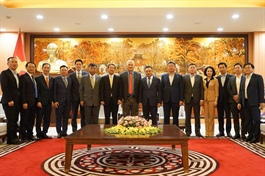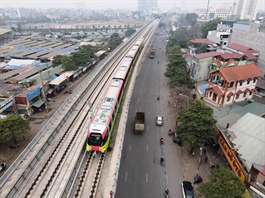Economic institution reform key to breaking through middle-income trap: experts
Economic institution reform key to breaking through middle-income trap: experts
As Viet Nam is about to join the group of upper-middle-income countries and pursuing the goal of becoming a developed and high-income country by 2045, the continuous renovation of economic institutions becomes more urgent than ever, said experts at a political dialogue workshop in Ha Noi.

Economists said only 13 out of 101 middle-income countries in the 60s managed to break through the middle-income trap by the end of 2008, demonstrating the challenging nature of sustainable economic growth.
Pham Hong Chuong, head of the National Economics University (NEU), said the implementation of a market economy had played a vital part in transforming the country, from a poor country with an average income per capita of US$200 in the early 90s, into one of the fastest-growing economies in the world.
He said, however, there were still many shortcomings and limitations, made evident with numerous interventions by the Government in the running of the economy, including regulations to control the prices of fuel, electricity, air tickets and medicine.
In many instances, overbearing control from the Government can and did result in market dysfunctions such as last year's nationwide fuel shortage.
Government control at least has played a significant role in major State enterprises such as Vietnam Electricity (EVN) and Vietnam Airlines suffering continuous financial losses; and in such case as public hospitals which are constantly overwhelmed, underfunded and underequipped.
Chuong also pointed to a number of shortcomings in the operation of the Vietnamese market economy currently, including problems in intellectual property protection and the overlapping of legal documents.
Participation by individuals in modern financial markets, including forex, gold, and derivatives, has been limited. The process to equitise State-owned enterprises has been sluggish due to either lacking legal frameworks or overly complicated regulations, hindering the business community.
"A prime example is the property market with currently hundreds of projects with legal complications that have not been addressed for years," Chuong said.
Economists have long called for another major reformation of the country's economic institution, which can provide the economy with a much-needed boost to reach its high-income status target in 2045.
"We have seen what it can deliver success in the last 30 years. Now we must stay on this path to modernise the economy and further integrate into the global economy," Chuong said.
He said the key to long-term economic prosperity often lay in institutional economic reform.
He said the Government had seen some success in the last decade in stabilising the macro economy, improving the investment-business environment and international trade. The next step is identifying and addressing major bottlenecks to help maintain and promote confidence among foreign and domestic investors, an essential task against global economic uncertainties.
Fred McMahon from the Fraser Institute, a Canadian economic think tank, said Viet Nam is in a prime position to play catch-up with developed economies since the cost to implement reform is much lower for the Southeast Asian country.
Economic freedom, said McMahon, is what separates countries that can break out of the middle-income trap and those that fail.
Dinh Tuan Minh, director of the Market-based Solutions Centre for Social and Economic Issues (MASSEI), held that Viet Nam is becoming closer to the group of upper-middle-income countries in terms of component indexes such as government scale, legal system and ownership, and credit, labour and business management. However, the country has a long way to go in other indexes such as good currency and international trade.
Tuan gave a number of suggestions in economic institution reform based on the global economic facilitation criteria.
He said that it is necessary to review non-tariff barriers towards clearance, transparency and stability, while staying persistent in administrative reform in customs, and continuing to review regulations on capital control in compulsory procedures.
According to a World Bank report, the Southeast Asian economy reported an income per capita of US$3,590 in 2021 as a lower-middle income country. The Government has set a target to become an upper-middle-income with GNI per capita between $4,046 and $12,535 by the end of 2030.






















